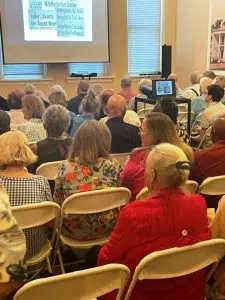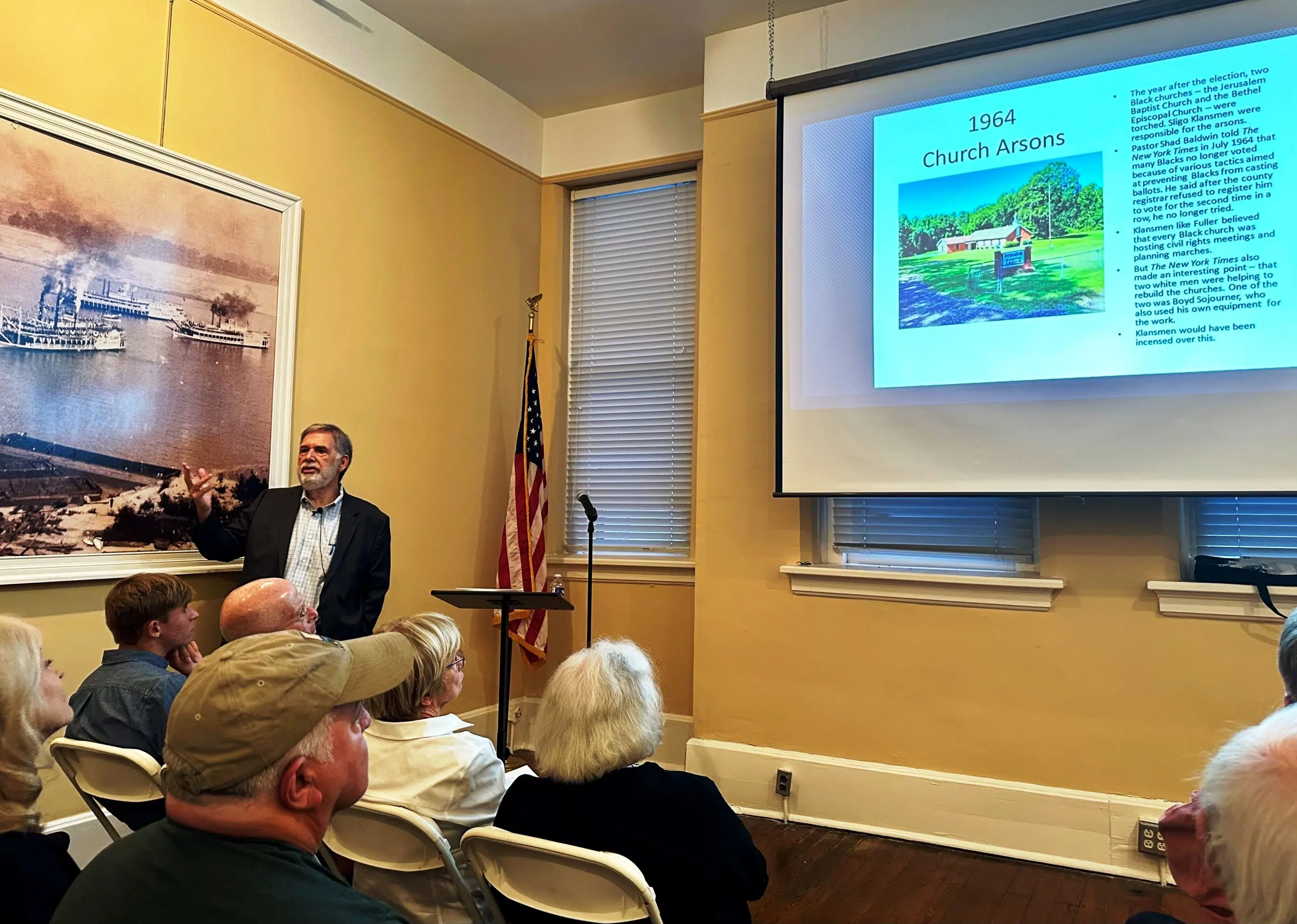NATCHEZ, Miss. — Stanley Nelson’s talk on the 1966 murder of Ben Chester White drew 120 people to the Sept. 26 meeting of the Natchez Historical Society at the Historic Natchez Foundation, according to people who attended the event.
The attendance set a record for the society, which averages 50 people at the monthly meetings, according to Alan Wolf, a director of the society and its program chair.
However, the recent meeting with Nelson rivals the society’s annual dinner in January that set a record with more than 100 attendees, Wolf said.
“It was electric,” Wolf said. “There were so many new faces, and we were on the edges of our seats.”
Jeff Mansell, lead historian of the Natchez National Historical Park, agreed. “This is as good as it gets,” he said. “We had a great attendance, and people were deeply moved by the presentation.”
“The NHS meeting Tuesday night was a huge success,” said Linda Ogden, society board member. “The audience was indeed large and diverse.”
Society board member Adam Gwin said the gathering says a lot about the community: “I think it says a great deal for a community that wants to look at its past and face it honestly.”
The presentation
Nelson’s presentation was titled, “Murder on Pretty Creek: New Revelations on an Old Case.” It focused on White, the 67-year-old Black man who was executed in 1966 by members of the Klan. White lived in a small community known as Sandy Creek, where his house still stands to this day.

Ben Chester White
(1899 – 1966)
Nelson talked about White’s alleged killers, two of whom, Ernest Avants and James Lloyd Jones, were charged but not convicted in 1967; and a third one, Claude Fuller, who was never brought to trial. Avants was convicted decades later in federal court and died in prison a short time after his conviction.
During his talk, Nelson focused on the Klan activities in the Kingston community. He also discussed the personal life history of White and his friends. Nelson said White was only five feet tall and weighed 155 pounds. He was known as a “soft spoken gentleman” who was not involved with political or civil rights activism.
Nelson spoke about Jimmy Carter and Boyd Sojourner, both of whom became Adams County Supervisors. Both had also worked cattle together with White, and they knew each other all their lives, Nelson said. Carter owned the farm where White had lived and worked.
Nelson zeroed in on the planning of the murder and how it went down. He showed, among other things, that the Klan made two attempts on White’s life.
One of White’s murderers said they killed him in order to lure Dr. Martin Luther King Jr. to Natchez to be assassinated. Nelson believes the killing was a “local action” and said he found no evidence connecting the murder to higher ranks of the White Knights of the Klan.
Nelson said a longer version of his presentation will be posted on Louisiana State University’s website (lsucoldcaseproject.com).
Nelson is the former editor of the Concordia Sentinel in Ferriday, La. He is also the author of “Devils Walking: Klan Murders Along the Mississippi River in the 1960s (LSU Press, 2016) and “Klans of Devils: The Murder of a black Louisiana Deputy Sheriff” (LSU, 2021).
The audience
Nelson said he was happy to share his research on the White’s murder and quite pleased to have a large and diverse audience.

Stanley Nelson’s presentation on Ben Chester White drew 120 people to the Sept. 26 meeting of the Natchez Historical Society at the Historic Natchez Foundation.
(Photo courtesy of Jane Gardner)
“It was really good to see people so interested in our history and want to know about that terrible thing that happened to Ben Chester White,” Nelson said. He noted the audience was “very attentive” and asked “great questions.”
Nelson said relatives of White also attended the meeting, as did Denise Jackson Ford, daughter of slain Natchez civil rights leader Wharlest Jackson Sr.
“It was just a really great mixture of age groups and great turnout,” Nelson said. “I was glad to see good African American representation there Tuesday night. Hopefully they will become part of the work being done by the Natchez Historical Society.”
The audience included a white couple of some years who were farming near the area where the murder took place, according to Wolf. He added, “They knew Chester White. To him, he was Mr. Ches. They came and were very touched. They were shocked at the time of the murder.”
Wolf said the meeting amounted to a memorial service to Chester White. The room was packed, he said, noting the meeting was a big deal in exposing the horror of the Ben Chester White case.
“There was some belated justice done for Mr. White simply by the telling of his story,” Wolf said.
“Our audience doesn’t shy away from the difficult topic of race,” he continued. “To the contrary, there may be a deep-seated desire to talk about it, and as long we have people like Stanley Nelson, who is profound and sympathetic, without being shrill and demagogic, we can have a good discussion.”
Wolf and others said the Sept. 26 meeting will be hard to top. “We can equal this in future programs, but in terms of gravitas, we will never exceed it,” Wolf said.





Comments